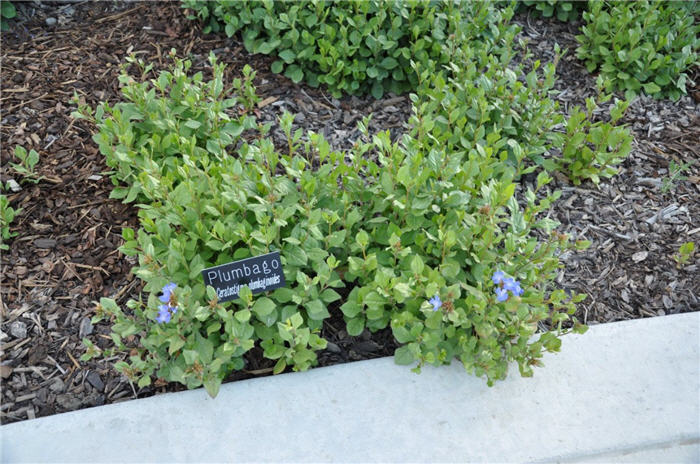| Botanical Name: Ceratostigma plumbaginoides | |
| Common Name: Dwarf Plumbago, Dwarf Leadwort |

-
Anatomy
-
Culture
-
Design
Plant Type
Ground cover, Perennial
Height Range
Under 1'
Flower Color
Blue
Flower Season
Summer, Fall
Leaf Color
Dark Green, Red
Bark Color
n/a
Fruit Color
n/a
Fruit Season
n/a
Sun
Full, Half, Shade
Water
Low, Medium
Growth Rate
Moderate
Soil Type
Sandy, Clay, Loam, Rocky, Unparticular
Soil Condition
Average, Poor, Well-drained, Dry
Soil pH
Neutral, Basic
Adverse Factors
n/a
Design Styles
English Cottage, Formal, Japanese, Meadow, Seascape, Woodland
Accenting Features
Fall Color, Showy Flowers
Seasonal Interest
Summer, Fall
Location Uses
Entry, Perennial Border, Shrub Border, Foundation, Patio, With Rocks
Special Uses
Erosion Control, Filler, Mass Planting, Small Spaces
Attracts Wildlife
n/a
Information by: Stephanie Duer
Photographer: Linda Engstrom
Photographer: Linda Engstrom
-
Description
-
Notes
Attractive groundcover with glossy green foliage. Intense, cobalt blue flowers emerge in late summer, lasting into fall, when the foliage turns burgundy red. Forms mats 6 to 8 inches tall and spreading 12 to 18 inches. Stunning autumn presence. Pairs well with Moor grass, perennial geraniums, and lady's mantle.
Grow in well drained soil in full sun to light shade. Adaptive to soil types. Does well in dry shade; in full sun it may need more frequent watering. This perennial is very late to emerge in the spring, so don't loose patience. It's a good idea to mark younger plants going into the winter so that you know where they are come spring and don't accidentally dig them up.